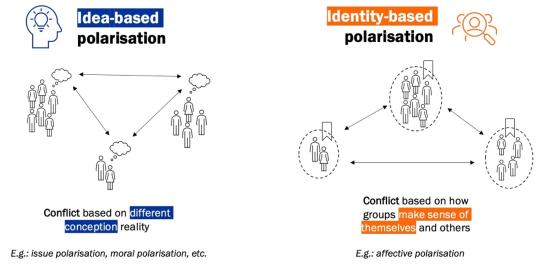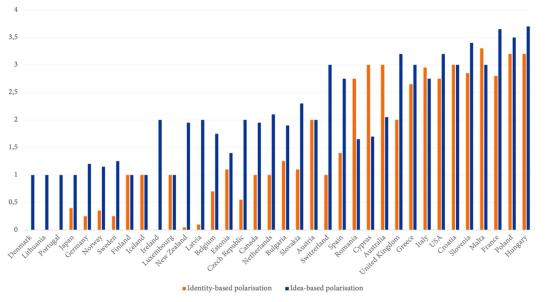
by Kamil Bernaerts, Benjamin Blanckaert and Didier Caluwaerts
All over the world, democracies are affected by polarisation. Nevertheless, remarkable differences between countries exist. Scandinavian countries, for example, do much better than France, the UK, or the US. A large-scale comparative study by VUB-researchers Kamil Bernaerts, Benjamin Blanckaert and Didier Caluwaerts attributes some part of that variation between countries to their political institutions. Their message is hopeful: within the right institutional conditions, democracies can successfully curtail polarisation.
Why would that matter? Because in fact, polarisation refers to how democracies deal with the inevitable differences between citizens. They are built to consider everyone’s opinion and interests, but they can never implement all of them. Obviously, this generates conflict. If such conflict escalates, it might result in polarisation. After all, the authors define polarisation as a process of increasingly diverging actors. More specifically, they distinguish two forms: polarisation based on ideas and on identities. In the former, irreconcilable views give rise to polarisation, while in the latter groups clash because of different identities. The conflicts that fuel polarisation thus either concern the ideas held by different groups, or specifically who they are. When Republicans no longer interact with Democrats simply because they belong to the other ‘camp’, they could be seen as polarized on the level of identities. However, when their specific opinions would become ever more different, they would be seen as polarized on the level of ideas.


In a healthy democracy, opinions can and should clash firmly. But when citizens no longer wish to speak to each other, the idea of democracy is at risk. Prior research has already shown that polarisation can lead to strong divisions, political violence and, in extreme cases, even to the demise of democracy. The storming of the US Capitol illustrates neatly how polarizing processes have the power to shake things up badly.
Given those concerning consequences, prior research has already looked at some possible causes of polarisation. However, this research looks at how polarization can possibly be diminished. And yes, there is reason for hope. Based on international data, the authors claim that the strength of both forms of polarisation is strongly linked to a country’s institutional set-up. It is therefore no coincidence that on average, majoritarian democracies such as the US perform less than consensus democracies such as Denmark, Norway, Sweden, Finland or Belgium. Unlike majoritarian democracies, where only a few parties vie for power and where decisions are made by simple majority, consensus democracies can rely on political institutions that better represent the variety of identities in society.
It is precisely this focus on political inclusion that serves consensus democracies well in dealing with polarisation. After all, the search for consensus at the institutional level seems to trickle down to the broader society. Interestingly, this is mostly true for identity-based polarisation and only to a lesser extent for idea-based polarisation. In other words, although polarisation over important political issues already occurs less in consensus democracies, hostility between political camps is even rarer, compared to majoritarian democracies.
The authors conclude that political institutions (in particular PR electoral systems, multiparty coalitions, and federalism) do make a difference in the fight against polarization. Citizens and policymakers that are concerned about increasing levels of polarization in society should therefore dare to question their political institutions and encourage initiatives that foster political inclusion.
About the authors:
Kamil Bernaerts is a PhD researcher in Political Science at the Vrije Universiteit Brussel, Belgium and at the University of Warwick, United Kingdom under a EUTOPIA Joint PhD Fellowship. His research interests focus mainly on polarization and conflict in democratic societies.
Benjamin Blanckaert is a PhD student in Political Science at the Vrije Universiteit Brussel (Belgium) and Research Foundation – Flanders (FWO). His research deals with consociational democracy, Belgian federalism, conflict management and electoral systems.
Didier Caluwaerts is Associate Professor of Political Science at the Vrije Universiteit Brussel, Belgium. His research interests focus on democratic innovation, deliberative democracy, democratic myopia, federalism and Belgian politics.
